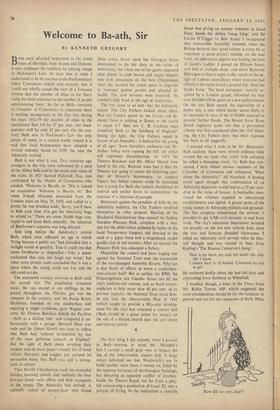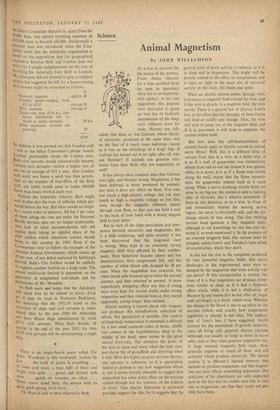Welcome to Ba-ath, Sir
By KENNETH GREGORY BATH once afforded inspiration to the comic muse of Sheridan, Jane Austen and Dickens; it now continues the tradition by seeking refuge in Parkinson's Law. At least that is what I understand to be its reaction to the Parliamentary Select Committee—which said recently that it 'could not wholly accept the view of a Treasury witness that the number of ships in the Navy really has little relevance to the number of people administering them.' So far as Bath—certainly its Chamber of Commerce—is concerned there is nothing incongruous in the fact that during the years 1952-59 the number of ships in the operational fleet fell by 37 per cent., but head- quarters staff by only 12 per cent. On the con- trary Bath sees in Parkinson's Law the only gleam of sanity in a wicked world; indeed it is said that local businessmen have adopted a revised calendar based on 1939, the year the Admiralty arrived.
Bath is not what it was. Two centuries ago strangers to the city were welcomed by a peal of the Abbey bells and by the music and voices of the waits. In 1827 Samuel Pickwick, Esq., was confronted by the Master of Ceremonies who exuded, 'Welcome to Ba-ath, sir. This is indeed an acquisition. Welcome to Ba-ath, sir.' But when Yehudi Menuhin descended from the London train on May 29, 1958, and called to a porter, he was brushed aside, 'Sorry, you'll have to bide your time. I've got the Admiralty bags to attend to.' There are some 26,000 bags con- veyed to and from Bath annually: the rehearsal of Beethoven's concerto was long delayed.
And long before the Admiralty's arrival Bath, which once reflected an age in which 'living became a public art,' had dwindled into a twilight world of gentility. True it could one day move Swinburne to rhapsodise—Tike a queen enchanted that may not laugh nor weep'; but other more prosaic souls concluded that it was a place where the young could not live and the old could not die.
The nineteenth century survived in Bath until the second war. The population remained static, the rate stayed at ten shillings in the pound throughout the Thirties, gas was the cheapest in the country, and the Pump Room Orchestra, founded on one double-bass and enjoying a single trombone, gave Wagner con- certs. Sir Thomas Beecham beheld the Pavilion —built as a skating rink—and compared it un- favourably with a garage. Bernard Shaw was rude and Sir Osbert Sitwell was soon to reflect that Bath had 'suffered devastation by one of the most philistine councils in England.'
But the sight of Bath chairs awaiting their cargoes and the local paper's weekly list of hotel visitors (baronets and knights just scraped in) persuaded many that Bath was still a strong- hold of culture.
Then Neville Chamberlain made his mournful Sunday morning speech, and suddenly the four five-star hotels were offices and their occupants in the streets. The Admiralty had arrived. A colonel's widow of seventy-four who found three males thrust upon her Georgian house determined to do her duty in the cause of democracy; but when one of her guests appeared after dinner in pink braces and carpet slippers and took possession of the best Chippendale chair she recalled her youth spent in organdie at viceregal garden parties and pleaded ill- health. The civil servants were removed; the colonel's lady lived to the age of ninety-two.
The war came to an end—but the Admiralty stayed. The City Fathers looked about them. Had not Landor gazed on the Circus and de- clared 'there is nothing in Rome or the world to equal it'? Had not C. B. Cochran once visualised Bath as the Salzburg of England? Seeing the light, the City Fathers opted in favour of an Assembly—'a festival for the young of all ages.' Soon Geraldo's orchestra and Mr. Arthur Askey were topping the bill; yet critics still expressed dissatisfaction. In 1955 Sir Thomas Beecham and Mr. Oliver Messel were lured to the city. Rumour even had it that Sir Thomas was going to return the following year, that of Mozart's bicentenary, to conduct Figaro; but before rumour could be translated into a scoop for Bath the council abandoned its festival and settled down to contemplate the erection of a hilarious skyscraper.
Buttressed against the penalties of folly by the Admiralty industry, the City Fathers involved themselves in other projects. Hearing of the Blackpool Illuminations they opened the Sydney Gardens Pleasure Park, complete with a beer tent for the plebs (often picketed by ladies of the local Temperance League), sad dancing in the mud to a gipsy band and a magnificent model gorilla clad in red trousers. After six seasons the Pleasure Park was adjudged a failure.
Meanwhile the council bad been waging war against the National Trust over the restoration of the war-damaged Assembly Rooms. Why not a nice block of offices, at worst a conference- cum-concert hall? But as neither the RPO, the Concertgebouw nor Claudio Arrau can 1111 the city's medium-size cinema, and as hotel accom- modation is little more than 40 per cent. of its pre-war capacity, the National Trust stood firm. In any case the Abercrombie Plan of 1945 (which sought to provide a fifty-year develop- ment for the city) had ordained a concert hall ('Bath should be a great centre for music') on the site of a blitzed church near the city centre and railway station.
The first thing I did recently when 1 arrived in Bath—bearing in mind Mr. Menuhin's fate I carried a small grip—was to inspect the site of the Abercrombie concert hall. A large notice informed me that Woolworth's are to build another store there. I moved on, lulled by the supreme harmony of the Georgian buildings, but detecting an apparent conflict of loyalties. Inside the Theatre Royal, not far from a play- bill announcing a production of Louis XI, was a portrait of Irving. In the auditorium a capacity house was giving an ecstatic welcome to Salad Days. Inside the Abbey ('snug lying,' said Sir Lucius O'Trigger to Bob Acres) 1 re-captured that memorable Assembly moment when the Bishop declared that 'good culture is every bit as important as good drains'; outside, on the west front, an aldermanic pigeon was fouling the foot of Jacob's Ladder. I passed up Milsom Street, now full of multiple shops, and down Bathwick Hill (open to heavy night traffic, much to the de- light of Labour councillors) where someone had affixed to the name board a printed slip, 'Send the Yanks home.' The local newspaper, recently ac- quired by a London group, informed me that soon £60,000 will be spent on a new police station. On the arts Bath spends the equivalent of a penny rate, a sum which hardly seems likely to be increased in view of the £150,000 required to prevent further floods. The Bristol Avon River Board engineers point out that a prevention scheme was first considered after the 1947 flood- ing; the City Fathers deny that their response has been at all laggardly.
I entered what I took to be Mr. Betjeman's Bath teashop; there were several ordinary little women but no male who might with certainty be called a thumping crook. My Bath bun con- sumed, I next visited various members of the Chamber of Commerce and whispered, 'What about the Admiralty?' All blanched. A leading estate agent thought that confirmation of an Admiralty departure would lead to a 25 per cent. drop in the value of houses. A bookseller men- tioned the volumes supplied to educational establishments and sighed. A grocer spoke of the ready money in Admiralty pockets and groaned. The bus company enumerated the services it provides to get 4,700 civil servants to and from work. The city's education department lectured me proudly on the ten new schools built since the war and forecast denuded classrooms. I asked an Admiralty civil servant what he him- self thought and was treated to lines from Kipling's 'The Roman Centurion's Song': Here is my heart, my soul, my mind—the only life I know.
I cannot leave it all behind. Command me not to got He muttered darkly about the bad old days and commuting from Surbiton to Whitehall.
I recalled, though, a letter in the Times from Mr. Robin Turton, MP, which suggested the main consideration should be for the taxpayer in general and not for the ratepayers of Bath. What 'How did we vote. dear?' the Select Committee objected to, apart from the 26,000 bags, was annual travelling expenses of
439,000, soon to become £46,000. (Incidentally a Pleasant note was introduced when the Com- mittee noted that the Admiralty organisation is based on the supposition that the geographical separation between Bath and London does not exist.) So I sought enlightenment on the cost of removing the Admiralty from Bath to London. MY informant did not pretend to give a complete Picture but suggested the bill for a house-owning civil servant might be somewhat as follows :
Removal expenses . • approx. 40 Transfer grant—ranging from £25 to £135 .. average 90 Misc. expenses .. average 45
Excess rent, max. £110 p.a., con- tinues indefinitely but re- duced as salary increases • . 80 p.a. Other payments, variable but probably • • • • 15
£270
In addition it was pointed out that London staff and as the Select Committee's phrase 'nearer London' presumably means the London area, atlt civil servants would automatically become London civil servants—receive a higher rate of Pay on an average of /35 a year. Also London staff work two hours a week less than provin- cials so the transfer of four-fifths of the Bath staff., say 4,000, would seem to imply 400,000 fewer man-hours worked each year. Without the Admiralty industry, Bath might Well decline into the state of lethargy which pre- vailed before the war. But there would no longer be a social order to preserve. All but 5 per cent. of those taking the cure are under the National "ealih Service; spas arc no longer fashionable. And lack of hotel accommodation will tell against Bath taking its rightful share of the £200 million which American tourists should bring to this country by 1969. Even if the Government were to follow the example of the Austrian Federal Government, which makes up 40 per cent, of any deficit sustained by Salzburg's festival, Bath's City Fathers would be unlikely to organise another festival on a large scale. The annual small-scale festival is dependent on the generosity of enlightened individuals and the enthusiasm of Mr. Menuhin.
So Bath waits and hopes that the Admiralty . will stand firm by its refusal to move. Even so, it puts its trust in Professor Parkinson, for assuming that the 1952-59 trend in the reduction of ships and civil servants is main- tained, then by the year 2000 the Admiralty will have fifteen ships administered by some 4,7l2 civil servants. What Bath dreads, of course, is the end of the year 2043, for then 2,205 civil servants will be administering a single
Ship.
There is an Anglo-Saxon poem called The Rub:. 'Wondrous is this stone-wall; broken by fate . . . the work of giants is crumbling . . . in times past many a man light of heart and bright with gold . . . proud and flushed with
wine gazed on treasure, on silver. . . . Slone courts stood here; the stream with its great gush sprang forth hotly. . . The Ruin is said to have referred to Bath.



































 Previous page
Previous page